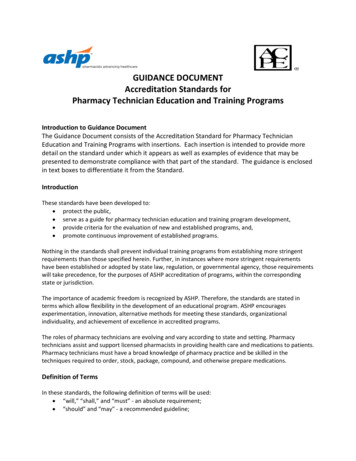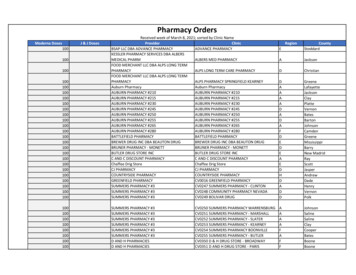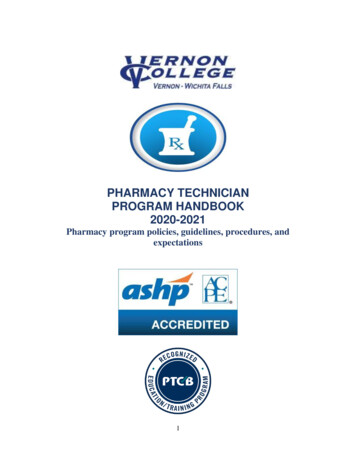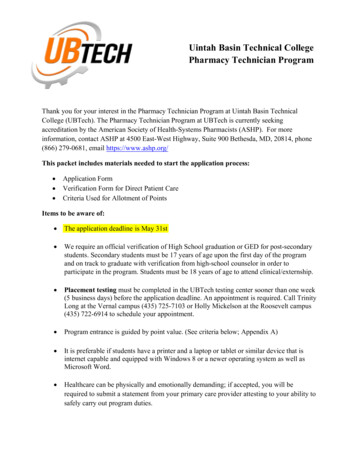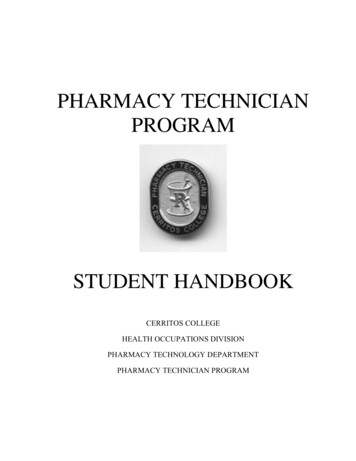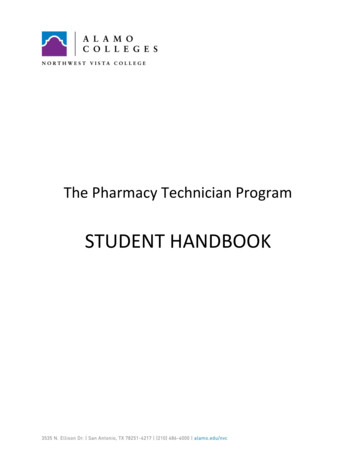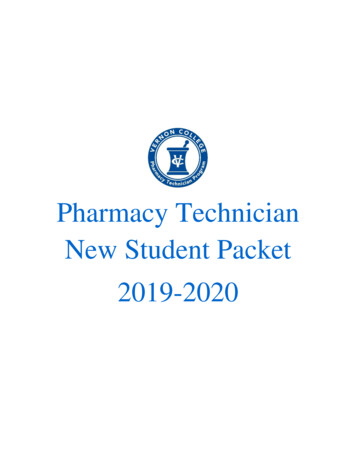
Transcription
ASHP Accreditation of PharmacyTechnician Education ProgramsChristine Swyres, RPh, PharmDMSHP/ICHP Spring MeetingApril 16, 2011Christine Swyres reports nosignificant or relevantrelationshipsp or other affiliationsto disclose.Objectives:After this presentation, the participant will be able to:Recognize the benefits of attending an ASHPaccredited pharmacy technician training programDescribe the national movement towardscertificationIdentify the ways certification and accreditedtraining can improve career flexibility1
The counting and pouring now oftenalleged to be the pharmacist’s chiefoccupation will in time be done bytechnicians and eventually by automation.The pharmacist of tomorrow will functionby reason of what he knows, increasingthe efficiency and safety of drug therapyand working as a specialist in his ownright. It is in this direction thatpharmaceutical education must evolvewithout delay.—Linwood F. Tice, D.Sc.,Dean, Philadelphia College of Pharmacy and Science (1966)1ASHP Pharmacy Technician InitiativeWhat: Advocacy partnership with goal ofdeveloping an educated, trained, certified andregistered pharmacy technician workforce.Who: ASHP and individual state affiliates.How: Joint advocacy to promote a qualifiedtechnician workforce, with strategies andtactics unique to each state.Status: Launched in May 2008. 19 statessigned on so far. IL and MO are partners inthis initiative.ASHP Positionon Pharmacy TechniciansWell-qualified, competent pharmacy techniciansare integral to the safe provision of medicationsin all settings. To achieve this, ASHP: Support uniform training – ASHPASHP-accreditedaccredited Support certification through PTCB Support registration through state boardsIdeally, the actions should be completed in thisorder.2
Positions of other OrganizationsAmerican Pharmacists Association (APhA) supports nationally recognized standards and guidelines for theaccreditation of training programs. supports the continued growth of accredited education and trainingprograms supports the following minimum requirements for all new pharmacytechnicians by the year 2015:Successful completion of an accredited education and trainingprogramCertification by the Pharmacy Technician Certification Board (PTCB)American College of Clinical Pharmacy (ACCP) Pharmacy technicians are authorized by both state regulation andemployment status have successfully completed an education and training program that isaccredited by a nationally recognized accrediting body; and are certified by the Pharmacy Technician Certification Board (PTCB)CCP Recommendations Model curriculum for all techniciansASHP Model Curriculum National Programmatic Accreditation of Technician National,Education & Training ProgramsASHP Accreditation Competency Based ExaminationPTCB ExaminationNational Association of Boards of Pharmacy(NABP)– Task Force on Pharmacy TechnicianEducation and Training ProgramsNABP Model Practice Act recommends that states thatcertify technicians recognize certification by PTCB and thatall pharmacy technicians be PTCB certified by 2015.Recommended that NABP should: Encourage boards of pharmacy to require completionof an education & training program that meets minimumstandardized guidelines. Encourage boards to require completion of anaccredited education & training program by 2015 Assist in developing a national accreditation system foreducation & training programs that uses a singleaccrediting agency by 20153
NABP Task ForceRecommendations (cont.) Assist boards in defining the evolving roles ofpharmacists & technicians and technician education &training programs standards Encourage ACPE & ASHP to work collaboratively todevelop accreditation system for technician training &education Should encourage PTCB to include completion of andaccredited pharmacy education & training program andhigh school diploma or GED verification as criteria fortaking the PTCB examWhy Pharmacy Techniciansare so importantThere is growing complexity in medication use with acontinued focus on medication safety, quality.There is a need TODAY for well-qualified, competentpharmacy technicians for the safe provision of medications inall settings.The existence of a competent pharmacy technicians will befundamental to advancing the patient care role ofpharmacists in the FUTURE.There is need for defined, baseline skills and competenciesobtained through standardized education, training,certification and registration of pharmacy technicians.State Regulation of REGISTRATION(Source: NABP Survey of Pharmacy Law-2010)33 states require registration7 states require licensure: AK, AZ, CA, OR, RI, UT, WY10 states, plus DC, have no registration orlicensure requirements: CO, DE, DC, GA, HI, IN, MI, NY, PA, WA, WI4
State Regulation of: CERTIFICATIONPTCB Recognition in 30 states as one optionfor registration or for expanded techresponsibilities DepartmentDtt off VVeteranstAffAffairsi now requiresiPTCBcertification for technicians employed at GS-6 and above Texas Board of Pharmacy awarded PTCB contract astechnician certification provider for stateExCPT exam now available as wellPharmacy Technician CertificationBoard (PTCB) NCCA tered exam for thirteen years.Over 370,000 Certified Pharmacyy Technicians.Based on task analysis of pharmacy practice,across all practice settings. Has recertification process and CE requirement.5
Why there’s a need to set the bar On-the-job training is not adequate toprovide a consistently competentpharmacy technician workforceReview courses designed to pass thecertification exam are NOTcomprehensivehi training.t i iEstablishing a standard level of trainingis the only way to achieve consistencyThe only current national standard forpharmacy technician training is ASHPaccreditationPublic mistakenly assumes that PharmacyTechnicians are trained and certifiedWhat is Accreditation?A means of protecting the publicthrough meeting national standardsAqqualityy processpusingg expertspto: Set acceptable standards Measure compliance against standards Provide periodic ongoing assessment6
AccreditationA voluntary means of providing:Quality assuranceCredibilityPatient SafetyContinuous monitoring & improvementExamples:The Joint Commission (hospitals)American Council on Pharmacy Education (colleges ofpharmacy & pharmacist/technician CE)ASHP (residencies & technician training programsASHP-Accredited TrainingSignifies that the training program has been reviewedand has met or exceeded national standards forpharmacy technician training, including an on-sitesurvey by experts.The accreditation standards allow comparison to amodel curriculum based on a task analysis andinclude goals and objectives.The program must demonstrate didactic, laboratory,and experiential learning and a minimum 600 hoursinstruction required.The program is accredited (as opposed to theindividual or the school).ASHP Accreditation:Why is it important to a site?Pharmacy profession develops the standards,assures teaching and training meet contemporaryemployment needsShows sites commitment to excellence and consumerprotection, motivates site to improve trainingEnhances credibility & marketing of the programPeer review improves the program & providesnetworking opportunity with other pharmacytechnician educatorsSome sites are eligible for grants or funding forstudents in accredited programs7
ASHP Accreditation:Why is it important to a site?Some states require pharmacy technicians tocomplete accredited trainingEmployers recognize the value of ASHP accreditationand will preferentially hire students from accreditedprogramsOn site peer review survey at least every 6 yrs(Reviews curriculum, laboratory, & experientialtraining)Accreditation staff available to answer questionsASHP Accreditation:Why is it important to the student?Consumer protection – assured they are learning whatis required in the pharmacy professionSome states now require training in an ASHPAAccrediteddit d PharmacyPhTechnicianT h i i TrainingT i iProgramPIt builds their resumes.It helps them get hired.If students reciprocate to states requiring accreditedtraining, student is coveredASHP Accreditation:Why is it important to the public?Prepares students to help protect the public, bybeing well trained to help prevent seriousmedication errors from occurringPharmacists now require a Doctor of Pharmacyand are moving to a more clinical professionrequiring well trained pharmacy technicians tosupport them with the distribution processCurrently, there are no other national standardsfor the training of pharmacy technicians exceptASHP accreditation.8
ASHP Accreditation:Why important to Board of Pharmacy?Validation of training programs is an intensiveresource & labor processProven national accrediting body already hasinfrastructure in placeASHP AccreditationCurrently there are 160 ASHP-Accredited Pharmacy TechnicianTraining Programs* Majority are Vocational-Technical Schools and Community CollegesSeveral large chain drug store programs are ASHP-accreditedAll areas of practice (community, military, hospital) are accredited ASHP has accredited technician programs since 1982 Oversight for accreditation process provided by ASHP Commissionon Credentialing (19 pharmacists) including representatives from: Pharmacy Technician Training Program EducatorAACP (colleges of pharmacy)APhA (community) AMCP (managed care) ACCP (clinical) ASHP (hospital & health system) *Accredited or in accreditation process as of 1/10Illinois UpdatesEffective January 2010, must be certifiedwithin two years of hire Required to have proof of training Can be on the jobIL Board of Pharmacy evaluating techcheck-tech in some situationsICHP advocating to consider ASHPaccreditation to schools who are notcurrently accredited9
Missouri UpdatesSurvey to pharmacists, technicians andpharmaciesWorking groupQuestions?10
ICHP/MSHP 2011 Spring MeetingASHP Accreditation of Pharmacy Technician Training ProgramsChristine Swyres, PharmD121-000-11-013-L04-T121-000-11-013-L04-PPost Test Questions:1. Some of the benefits of attending an ASHP accredited program include:a. Assures teaching and training to meet contemporary needs in pharmacyb. Can facilitate reciprocating to another statec. Employers look for nationally standardized trainingd. All of the above2. The national movement towards technician certification has occurred because:a. Several highly public medication errorsb. Growing complexity of medicinec. Growing demands on pharmacist timed. All of the above3. Some ways that certification can improve career flexibility include:a. Allows for reciprocity across statesb. Some employers will only hire certified technicians, like the VAc. Experiential portion exposes student to a wide variety of pharmacyoptionsd. All of the above
ASHP Accreditation of Pharmacy Technician Training Programs Christine Swyres, PharmD 121-000-11-013-L04-T 121-000-11-013-L04-P Post Test Questions: 1. Some of the benefits of attending an ASHP accredited program include: a. Assures teaching and training to meet contemporary needs in pharmacy b. Can facilitate reciprocating to another state


